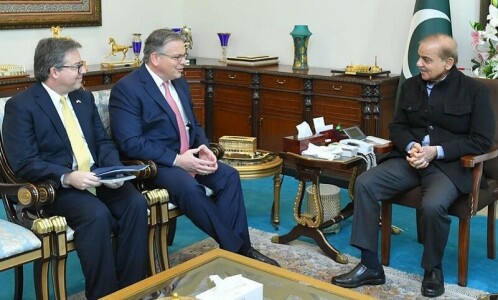WASHINGTON: Increasing vulnerability will force Pakistan deeper into debt, speakers at a seminar on US-Pakistan relations argued while urging Washington to help Islamabad rebuild its ailing economy.
The seminar — organised jointly by Wilson Centre, Washington, and the International Academy of Letters (IAL), USA — tried to explore how to promote US- Pakistan relations after the withdrawal of American troops from Afghanistan.
Speakers stressed the need to transform the security-oriented relationship between the two countries into an economic and trade partnership beneficial for both.
“The traditional military-to-military ties are just one pillar of the relationship,” said Prof Hassan Abbas who teaches international relations at the National Defence University, Washington.
“We cannot build a relationship on one pillar only. A partnership needs to cover all key aspects, trade, education, health, culture.”
Speakers at Wilson Centre event say country teetering on verge of default, urgently needs help to overcome economic crisis
He pointed out that even the security partnership should go beyond military-to-military ties. “A country’s security includes law enforcement, criminal justice, narcotics control, economic security, and social protections,” he said.
One of the sessions focused on the role the Pakistani diaspora in the US can play in promoting US-Pakistan relations.
While moderating the session, IAL President Ghazanfar Hashmi said that now was the time to transform Pak-US relations from geopolitics to geo-economics. Cultural and public diplomacy, he said, includes “establishing people-to-people contact and strengthening bilateral relations between the two nations.
Prof Abbas noted that there’s a convergence of interest on Taliban, TTP and the resurgence other militant groups, as both sides wanted to prevent.
Stressing the need to go beyond security, he said: “Enough funds in the security sector, give more to other sectors, such as IT, education, health and people-to-people engagement,” he said.
Prof Abbas argued that both sides “have been making blunders in the security sector”, which needs to be broadened to train civilian forces, such as the police as well.
Other speakers noted that the US had lowered its engagement with Pakistan since it withdrew from Afghanistan in August 2021, and got engaged in a power competition with China.
They pointed out that Pakistan was teetering on the verge of default and urgently needs help to overcome its economic crisis, which has constrained the government’s ability to provide basic needs to the people.
The speakers argued that the US can help Pakistan in coming out of this crisis, but it was not fully engaged with this issue.
They noted that while the US has not obstructed talks for the resumption of an IMF assistance package, they were not offering bilateral assistance.
The speakers noted that so far only China, Saudi Arabia and UAE had helped Pakistan in preventing a default, sending together about $3 billion to its pool to meet an IMF condition.
The IMF wants Pakistan to arrange $6.5 billion from bilateral donors to meet its financial obligations and to qualify for an IMF programme.
China, which is Pakistan’s largest creditor to whom it owes $27 billion, has rolled over and refinanced some of the other loans as well.
The speakers noted that this would not be a one-time arrangement as Pakistan would need around $25 billion a year for repayments and debt financing over the next few years.
They warned that this would increase Pakistan’s reliance on China, which is willing to help Islamabad for strategic and historical reasons.
The speakers urged the United States not to leave this space open for China as it would push Pakistan deeper into the Chinese camp and hurt US interests in the region.
Published in Dawn, April 29th, 2023














































Dear visitor, the comments section is undergoing an overhaul and will return soon.